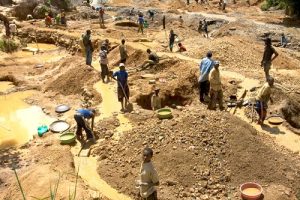Ethiopia has the potential to lead Africa’s shift to sustainable energy clarifications because of its diversified geographies and exceptional natural resources. Geothermal energy is one such resource that has enormous potential for the nation’s energy industry. Ethiopia, which is located in the East African Rift Valley, has significant geothermal potential that is mostly unrealized. Making use of this plentiful supply of clean, renewable energy has the potential to improve Ethiopia’s energy system, inspire economic expansion, and move the country closer to a sustainable and environmentally friendly future.
In recent years, Ethiopia has made significant strides in its pursuit of renewable energy. The country has already established itself as a leader in hydropower, with a number of large-scale hydroelectric projects contributing to its energy portfolio, like the Grand Ethiopian Renaissance Dam (GERD). However, the development of geothermal power presents a unique opportunity to diversify Ethiopia’s energy mix and reduce its reliance on traditional fossil fuels.
Geothermal power, derived from the Earth’s heat, offers numerous advantages over other renewable energy sources. It provides a consistent base-load power supply, unaffected by weather conditions or time of day, ensuring a stable and reliable source of electricity. Furthermore, geothermal energy is clean, emitting minimal greenhouse gases and pollutants, making it a key player in the fight against climate change.
According to the research, Ethiopia’s geothermal potential is estimated to be around 10,000 megawatts (MW), which, if harnessed effectively, could transform the country’s energy landscape. The Ethiopian Rift Valley, stretching across the country from the northeast to the southwest, is home to vast geothermal resources waiting to be tapped. The regions of Afar, Abaya, and other southern regional parts are particularly rich in geothermal reservoirs, offering abundant opportunities for exploration and development.
Tesfaye kassa, risk manager of the geothermal energy service license at the Ministry of Mines, says to the Ethiopian Herald that geothermal energy will assist in the production of hot water and various flower-related products along with energy. These projects have not only contributed to the diversification of Ethiopia’s energy mix but have also helped in reducing the country’s dependence on fossil fuels and mitigating the impacts of climate change.
He mentioned that the nation possesses natural resources that can produce 10,000 megawatts of geothermal energy and that 370 megawatts are expected to be used this year. Out of this, the Ethiopian Electric Power Service will generate 70 megawatts, while private investors will get license to generate the remaining 300 megawatts.
Geothermal energy is green, low-carbon, recyclable, and renewable energy characterized by a large reserve, wide distribution, cleanliness, environmental protection, stability, and reliability. This form of energy uses heat below the ground and can be used for various purposes, including generating electricity, heating, and cooling. With technological advancements, the energy is now being captured at a high volume. Increasing the requirement for clean energy for a range of applications, in turn, increases geothermal power generation across the globe.
He remarked that this geothermal energy will not significantly harm the environment and is much preferable in terms of environmental protection. More than 95% of it, according to him, is environmentally friendly.
Globally, geothermal power generation is escalating steadily with the growing demand for renewable energy. The Ethiopian government and other nations are taking green initiatives to overcome greenhouse gas emissions. Generating energy with no or few greenhouse gas emissions will reduce air pollution. Geothermal power is reducing the dependency on the energy generated from fossil fuels. Geothermal power plants emit 99% less carbon dioxide than fossil fuels. Since the energy is one of the most reliable sources of energy, which is cost-effective, sustainable, and environment friendly, the market demand for this renewable source of energy will continually be increasing as the world is looking for renewable solutions to a great extent.
Despite the fact that geothermal projects require careful environmental assessment to mitigate potential impacts such as land use changes, water resource management, and the release of gases and fluids during drilling. Balancing geothermal development with environmental preservation could present challenges.
The Middle East & Africa market is primarily concentrated in the East African Rift valley region. The region has a great geothermal potential for direct use and electricity production. East Africa is truly focused on developing renewable sources, including geothermal energy.
Ethiopia now has a viable and sustainable energy option in the form of geothermal energy. With its abundant geothermal resources, the nation has the chance to dominate the world’s production of geothermal energy. Due to plenty of problems, Ethiopia does not adequately utilize its natural resources for generating geothermal energy.
On the other hand, Kenya is the leading country in the production and consumption of geothermal across the Middle East & Africa. In 2020, over 92% of the electricity generated across Kenya was from renewable sources. The geothermal sector was the country’s major source of generated electricity, accounting for over 48.4% of the total electricity produced in 2020.
He emphasized that although the amount of hydraulic power produced is close to fluctuating depending on the amount of water in the country, once geothermal energy is produced, it is not interrupted and has the potential to be used for at least 100 years.
The benefits of geothermal power in Ethiopia extend beyond environmental considerations. The development of geothermal resources has the potential to create job opportunities and stimulate economic growth, particularly in rural areas where these resources are often located. Additionally, the reliable and consistent nature of geothermal power makes it a valuable asset for Ethiopia’s energy security and grid stability.
According to him, geothermal energy will give many people job opportunities; he also further stated that they are foreign nationals working in the areas where excavation has already begun. For instance, it is better to participated engaged Ethiopia residents engage rather than foreigner who has a permit to perform this activity, the number of professionals who run the service sector will rise.
However, despite the progress made, Ethiopia faces challenges in developing the necessary infrastructure to support geothermal power projects, including transmission lines and substations. The lack of existing infrastructure in remote geothermal-rich areas could pose logistical and cost-related hurdles.
Securing adequate funding and attracting private investments may be challenging, particularly given the high initial costs associated with drilling deep wells and constructing power plants. And also, the country faces a shortage of skilled professionals with expertise in geothermal exploration, drilling, and plant operations. Building technical expertise and capacity through education, training programs, and knowledge transfer initiatives could be a significant challenge.
Other challenges like limited exploration and resource assessment, high upfront costs, technological expertise and capacity building, infrastructure development, environmental considerations, and the need for a supportive regulatory framework, and the need for specialized skills and expertise.
He mentioned that finance is one of the main challenges to generating geothermal energy; the cost to drill a 3,000-meter geothermal energy well will be between five and seven million dollars. Geothermal energy power involves significant investment; he remarked that we are attempting to collaborate with foreign investors.
Furthermore, addressing the other challenges will require continued investment, research, and collaboration between the government, private sector, and international partners.
Establishing a robust regulatory framework and supportive policies is essential to attract investments and facilitate geothermal project development. Ensuring clear guidelines, licensing procedures, and incentive mechanisms may require comprehensive policy reforms and stakeholder coordination.
Ethiopia must prioritize the exploitation of its geothermal resources going ahead and foster an environment that will attract industry. And to the implementation of encouraging laws, systems for regulation, and financial incentives that promote geothermal research and development.
Geothermal energy offers Ethiopia the chance to restructure its energy structure, advance sustainable growth, and aid in the globally fight against climate change. Ethiopia may set the path for a greener and more affluent future due to its rich geothermal resources and unwavering dedication to renewable energy.
BY FIKADU BELAY
The Ethiopian Herald September 27/2023





